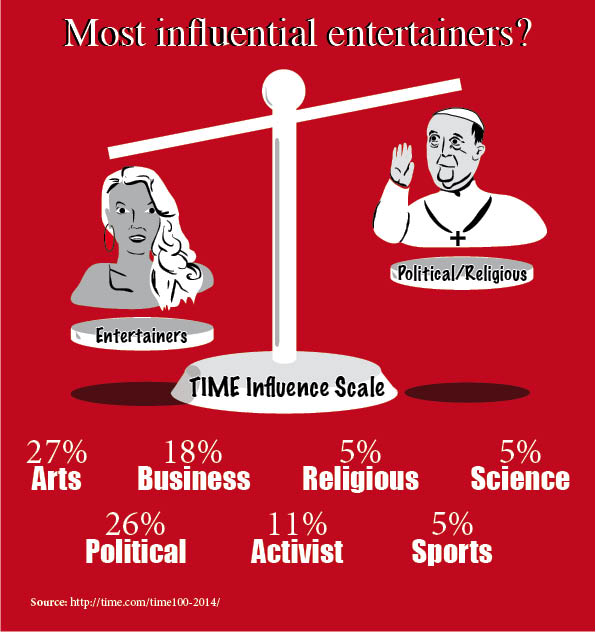
Plaster a picture of Beyoncé on a magazine cover and it’s bound to fly off the shelves.
That’s exactly what Time magazine did for its “Time 100: The Most Influential People in the World in 2014” issue released recently. Our beloved Queen Bey and every ounce of her fabulousness have become an obsession of our generation—and with good reason. As one of the hardest working artists, mothers and wives in the music industry, Beyoncé deserves this recognition as a role model for young women everywhere.
But this is definitely not the case with many famous women these days. Sure, many of them choose to fly under the radar and avoid the limelight. But more often than not, the press surrounding female celebrities who are constantly in the news focuses on their wrongdoings rather than their positive contributions to society. That doesn’t necessarily mean celebrities are doing more harm to society than good, but it does mean that their poor choices are often leaving a negative impact on society through the press.
So why are these people flooding Time’s Influential People list?
Entertainers make up 27 percent of Time’s list this year. That’s more than any other category, including political figures, business people, activists, religious figures, sports players and scientists.
Beyoncé makes sense; the magazine calls her a ‘titan’ on the list. Consistently making headlines when she so much as leaves her house with Blue Ivy gives her constant media attention, none of which is ever negative. Reports on Beyoncé tend to focus on her family, music, fashion and overall career—she naturally illustrates her family-oriented values, strong work ethic and the importance of strong, independent women. This leaves a positive impact on her fans and society, which absolutely makes her influential.
Some of the other entertainers that made the list are a bit more questionable. Actors and actresses such as Matthew McConaughy and Amy Adams appeared on the list, which made little sense to me. The reasoning behind their nominations is solely based on their acting skills. Both are wonderful performers and have made substantial contributions to the film world, but what are their positive impacts on society? What makes them so influential besides the fact that they’re celebrities? Does that make them worthy of being called societal influences?
It’s a different case for actress Kerry Washington. Her character Olivia Pope, political fixer on the TV drama “Scandal,” overcomes the challenges of age, race and gender. An African-American woman who kicks ass in the world of politics, Washington’s character sets a positive example for modern womanhood. She uses her clout off-screen as well in her work with the President’s Committee on the Arts and the Humanities for the past five years. The committee works to use arts-based education to inspire young people to follow their dreams. Sounds positively influential to me.
And then we have the one-of-a-kind Miley Cyrus. Personally, I adore the crazy girl. She had to do what she had to do to break free from her Hannah Montana persona. Did she take it too far? Probably. But the girl is ridiculous, and she owns it. Miley is undoubtedly talented and clearly works hard; she puts on a fantastically odd performance. That doesn’t mean she’s a great role model for young women though. And it certainly doesn’t mean she’s a positive influence on society.
The Time Influential People list doesn’t necessarily clarify that it consists of all positive influences. Heck, Vladamir Putin earned a spot on the list.
But doesn’t it make more sense to provide a list of positive influences rather than one that is bogged down with negativity? Yes, it’s realistic to depict the world as it is—negative influences and all. But doesn’t it make sense for Time to glorify 100 people who have done wonderful things for this world rather than those with negative influences?
Anne Gaslin can be reached at gasl8257@stthomas.edu.



